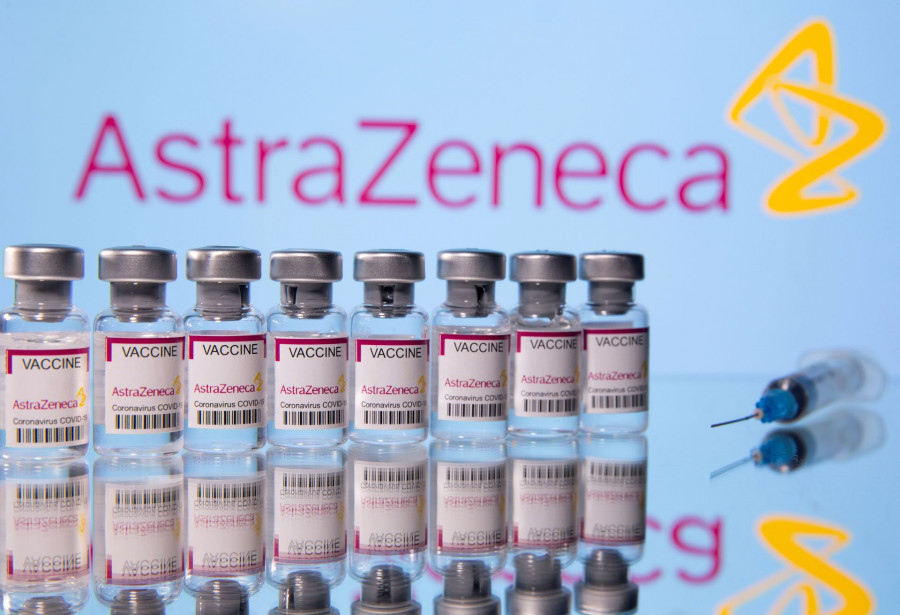Health
Over 3.8 million doses of AstraZeneca vaccine are in stock. 2.1 million doses to arrive soon
Ministry decides to provide AstraZeneca vaccine as a second dose and booster.
Arjun Poudel
Amidst shortages of the Vero Cell vaccine, the Ministry of Health and Population has decided to provide the AstraZeneca vaccine as a second dose and booster.
The decision to administer AstraZeneca as second dose and booster is in line with the recommendation of the World Health Organisation’s Strategic Advisory Group of
Experts on Immunisation, Health Ministry officials said.
A meeting of the National Immunisation Advisory Committee on Wednesday had also recommended vaccine mix and match for second doses and booster shots.
“As per the recommendation of the World Health Organisation’s Strategic Advisory Group of Experts on Immunisation and the National Immunisation Advisory Committee, a ministerial level decision was taken on Friday to administer AstraZeneca as the second dose,’ reads a statement issued by the Family Welfare Division of the Department of Health Services.
As per the decision, Covishield/AstraZeneca vaccine will be administered as a booster to those above 60, who were inoculated with Covishield/AstraZeneca, Moderna, Pfizer-BioNTech or Vero Cell vaccines in a primary series (people who took two shots).
Likewise, Covishield/AstraZeneca vaccine can be administered as a second dose if authorities lack the vaccine of the same manufacturer after administering that as the first dose.
The ministry has also decided to administer Covishield/AstraZeneca vaccine to those who were administered with Covishield/AstraZeneca, Vero Cell, Moderna, Pfizer vaccine abroad.
Research has shown that such ‘mix and match’ regimens are highly effective at preventing Covid-19—roughly matching or even exceeding the performance of mRNA vaccines like Pfizer-BioNTech and Moderna.
Scientists around the world have been discussing vaccine cocktails and trying to figure out the best mix and match for better protection against the coronavirus.
Administering a different Covid-19 vaccine after a single dose of the AstraZeneca or Pfizer-BioNTech vaccine is safe and effective and could boost the immune response, a study of 1,000 volunteers has found, according to a report published on December 7 in the British Medical Journal.
The results, reported in the medical journal Lancet, showed that having a dose of the Moderna vaccine after an initial AstraZeneca or Pfizer dose induced a higher binding and neutralising antibody response than seen after two doses of either AstraZeneca or Pfizer.
Studies have shown that people who receive two different Covid-19 vaccines generate potent immune responses, with side effects no worse than those caused by standard regimens, according to a report published in the science journal Nature in October.
Officials said that even if the government lacks the Vero Cell vaccine, there is no dearth of AstraZeneca vaccine.
According to the Logistic Management Section under the Department of Health Services, the government has 1,319,000 doses of Astrazeneca vaccine in stock. Apart from this, the government has over 2.5 million doses of Covishield, the AstraZeneca type vaccine produced by the Serum Institute of India.
“We are also getting over 2.1 million doses of AstraZeneca vaccine soon,” Dr Surendra Chaurasia, chief of the section, told the Post. “More AstraZeneca vaccines will come as per the need.”
Officials said that the government will not purchase additional doses as long as it gets the vaccine in aid and donations.
“We will not purchase additional doses of Covid-19 vaccine except for Pfizer-BioNTech vaccine for children between five and 11,” added Chaurasia. “Discussions have been held in several rounds to finalise the deal.”
The Health Ministry said that the remaining over 2,339,000 doses of Moderna vaccine will arrive on January 31 and on February 1.
The doses are part of the four million doses purchased by the government from the US manufacturer of the vaccine last August.
The doses were purchased through COVAX’s cost-sharing scheme with the Asian Development Bank’s loan.
First consignment of the vaccine doses was delivered on January 24.
Health Ministry officials said they are informed that four million doses of Sinovac vaccine will be delivered within February 7.
Besides, the COVAX facility, the United Nations backed international vaccine sharing scheme, will supply 6.2 million doses of pfizer-BioNTech vaccine soon.
Nepal so far has received 43,398,640 doses of vaccines, including the AstraZeneca, Vero Cell, Moderna, Janssen and Pfizer-BioNTech types.
The government has run out of its stock of Vero Cell vaccines. Nepal had received 19,736,400 doses of the Chinese Vero Cell vaccine.
Of them 9,746,270 doses have been administered as first doses; 7,821,406 shots as second doses and 64,406 jabs have been given as booster shots until Tuesday.
Of the total Vero Cell vaccine doses Nepal received, the government purchased 10 million doses through a non-disclosure agreement from the vaccine manufacturer Sinopharm. The consignments arrived on various dates. An additional 5,936,400 doses were bought through COVAX’s cost-sharing scheme.
China donated 3.8 million doses.
Nepal started administering booster shots against Covid-19 on January 4 after cases started to surge again, driven by the new highly contagious Omicron and Delta variants of the coronavirus.
On Saturday, 4,904 people tested positive to Covid-19—3,318 in 10,101 polymerase chain reaction tests and 1,586 in 4,461 antigen tests. Six people died due to complications related to coronavirus infections in the last 24 hours.
Nepal’s active cases as of Saturday stand at 87,329.
The Health Ministry said on Saturday that 14,015,324 people were fully vaccinated and 333,835 people have been immunised with booster shots so far.




 11.84°C Kathmandu
11.84°C Kathmandu















